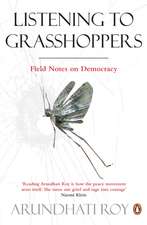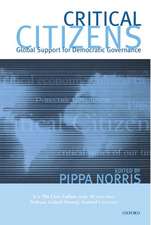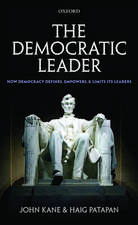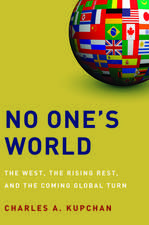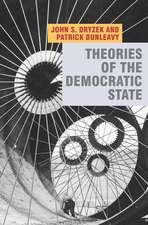The Taming of Democracy Assistance: Why Democracy Promotion Does Not Confront Dictators
Autor Sarah Sunn Bushen Limba Engleză Paperback – 2 noi 2016
| Toate formatele și edițiile | Preț | Express |
|---|---|---|
| Paperback (1) | 284.98 lei 6-8 săpt. | |
| Cambridge University Press – 2 noi 2016 | 284.98 lei 6-8 săpt. | |
| Hardback (1) | 720.50 lei 6-8 săpt. | |
| Cambridge University Press – 29 apr 2015 | 720.50 lei 6-8 săpt. |
Preț: 284.98 lei
Nou
Puncte Express: 427
Preț estimativ în valută:
54.54€ • 56.79$ • 46.09£
54.54€ • 56.79$ • 46.09£
Carte tipărită la comandă
Livrare economică 11-25 martie
Preluare comenzi: 021 569.72.76
Specificații
ISBN-13: 9781107642201
ISBN-10: 1107642205
Pagini: 288
Ilustrații: 15 b/w illus. 9 tables
Dimensiuni: 155 x 230 x 16 mm
Greutate: 0.39 kg
Editura: Cambridge University Press
Colecția Cambridge University Press
Locul publicării:New York, United States
ISBN-10: 1107642205
Pagini: 288
Ilustrații: 15 b/w illus. 9 tables
Dimensiuni: 155 x 230 x 16 mm
Greutate: 0.39 kg
Editura: Cambridge University Press
Colecția Cambridge University Press
Locul publicării:New York, United States
Cuprins
Part I. Introduction and Argument: 1. Introduction; 2. The argument: structure, agency, and democracy promotion; 3. Tame democracy assistance: what it is and why it matters; Part II. Testing the Argument: 4. Delegation and the allocation of democracy assistance; 5. Changes in American grant-making; 6. Creating the democracy establishment; 7. Jordan: aid in the shadow of geopolitics; 8. Tunisia: reform after revolution; Part III. Conclusions: 9. Should democracy promoters be set free?; Part IV. Appendices and References: A. Descriptions of categories of democracy assistance; B. List of interviewee affiliations; C. Major organizations in the democracy establishment; D. Data appendix.
Recenzii
'The Taming of Democracy Assistance is an impressive 'whodunit' that is an original contribution to the study of democracy assistance and an important statement on the lifeworlds of global NGOs. When rounding up those who might have tamed democracy assistance, the usual suspects are donors, who have the financial power to tell NGOs what to do and not do, and authoritarian governments, who have the power to keep democracy-promoting NGOs in their place and the motivation to do so. Although their fingerprints are at the scene, according to Bush, these NGOs are responsible for their own domestication. Worried about their own survival, they played the game in ways that kept their programs open and the money flowing in. And the very professionalization of the sector introduced a more technocratic, means-oriented expert class that lost the big picture.' Michael Barnett, George Washington University, Washington DC
'An empirically rich study that raises important questions about how much international democracy aid actually challenges authoritarian regimes.' Thomas Carothers, Carnegie Endowment for International Peace
'Sarah Bush's methodologically sophisticated and well-documented book shows that democracy promotion is challenging not just because of the strategic interests of donor states and the characteristics of recipient states but also because of the survival needs of NGOs, the actual implementers of many democracy promotion programs. Demands for quantifiable measures from donors and the need for access that can only be granted by recipient states create incentives for NGOs to develop 'tame' programs which do not directly challenge autocratic regimes.' Stephen D. Krasner, Graham H. Stuart Professor of International Relations, Stanford University, California
'The hallmark of a trailblazing book is its ability to provoke thought, ignite new areas of research, and generate stimulating questions. Bush's Taming of Democracy Assistance will shape the NGO research agenda for years to come.' Maryam Z. Deloffre, H-Diplo
'In The Taming of Democracy Assistance, Sarah Bush makes a novel contribution to this well-established field of donor-NGO research. Using a mix of statistical models and detailed case studies, Bush advances a scathing critique of the democracy promotion establishment by showing how the measurement revolution and the rising demand for evidence-based policies have distorted NGOs' core operations.' Andrew Heiss and Judith Kelley, The Journal of Politics
'An empirically rich study that raises important questions about how much international democracy aid actually challenges authoritarian regimes.' Thomas Carothers, Carnegie Endowment for International Peace
'Sarah Bush's methodologically sophisticated and well-documented book shows that democracy promotion is challenging not just because of the strategic interests of donor states and the characteristics of recipient states but also because of the survival needs of NGOs, the actual implementers of many democracy promotion programs. Demands for quantifiable measures from donors and the need for access that can only be granted by recipient states create incentives for NGOs to develop 'tame' programs which do not directly challenge autocratic regimes.' Stephen D. Krasner, Graham H. Stuart Professor of International Relations, Stanford University, California
'The hallmark of a trailblazing book is its ability to provoke thought, ignite new areas of research, and generate stimulating questions. Bush's Taming of Democracy Assistance will shape the NGO research agenda for years to come.' Maryam Z. Deloffre, H-Diplo
'In The Taming of Democracy Assistance, Sarah Bush makes a novel contribution to this well-established field of donor-NGO research. Using a mix of statistical models and detailed case studies, Bush advances a scathing critique of the democracy promotion establishment by showing how the measurement revolution and the rising demand for evidence-based policies have distorted NGOs' core operations.' Andrew Heiss and Judith Kelley, The Journal of Politics
Notă biografică
Descriere
Most government programs seeking to aid democracy abroad do not directly confront dictators. This book explains how organizational politics 'tamed' democracy assistance.

